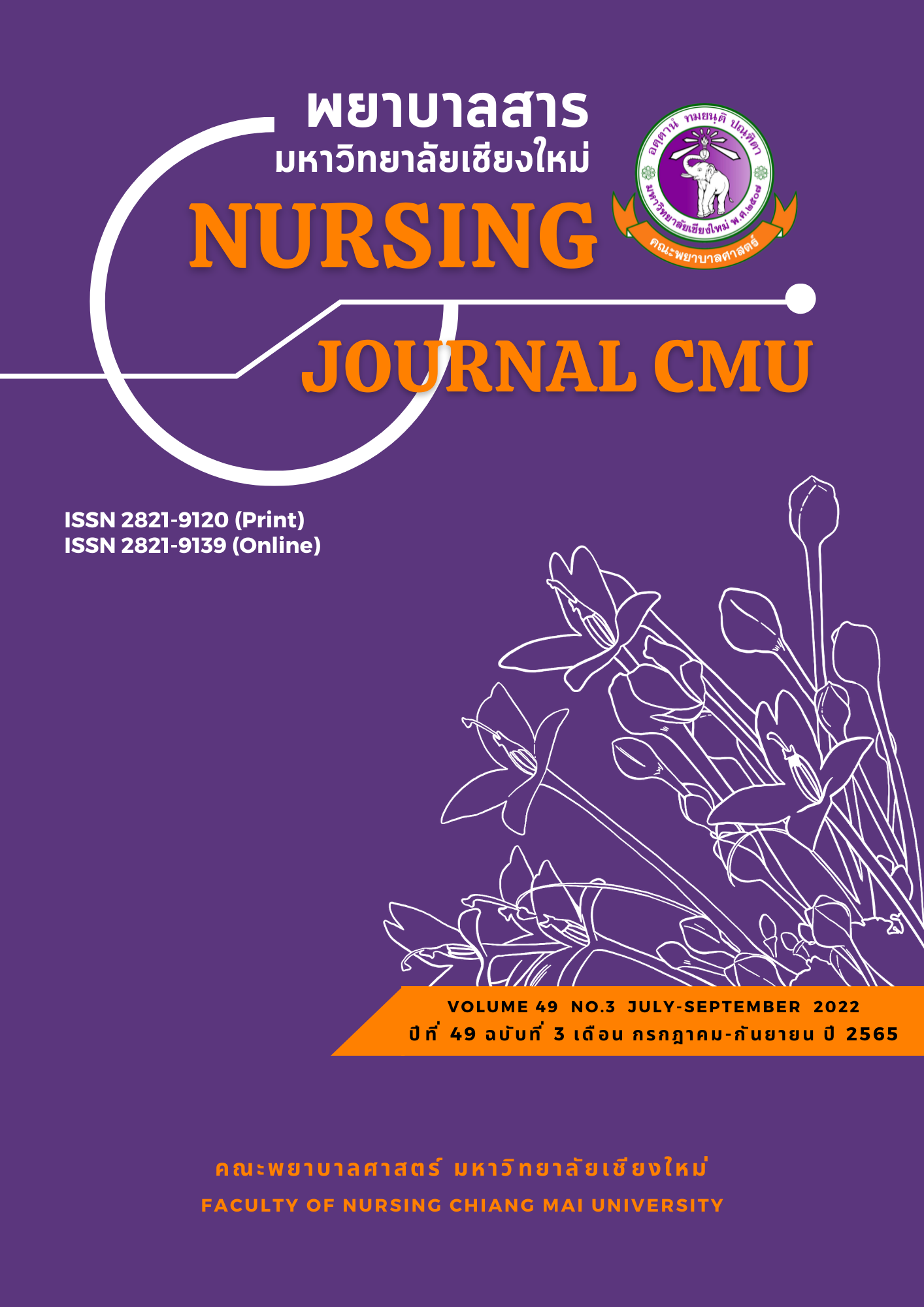Effects of a Self-management Program on Medication Adherence and Blood Pressure Level Among Persons with Hypertension in a Community
Keywords:
Self-management, Medical adherence, Hypertension in communityAbstract
This study examined the effects of a self-management program on medication adherence scores and blood pressure levels among people with hypertension in a community. It was a two-group quasi-experimental study with a pretest-posttest design. The objectives of the study were to compare medication adherence scores and blood pressure levels of people in a community. The sample group consisted of 48 people with hypertension, aged 35 to 59 years, who were equally divided with 24 people each in the experimental group and control group. The study was conducted in Sri Bua Ban Subdistrict, Muang District, Lamphun Province. The experimental group received the self-management program for 8 weeks. The program was developed by the researcher by applying the self-management concept (Kanfer & Gaelick-Buys, 1991), and included 3 steps: 1) self-monitoring, 2) self-evaluation, and 3) self-reinforcement. The control group received standard care. Data were collected using a demographic questionnaire and a medication adherence scale (in Thai) with a CVI of .96 and a reliability coefficient value of .98. Data on medication adherence scores were analyzed using the paired sample t-test and t-test for the independent sample. Blood pressure levels were analyzed by the Wilcoxon Matched Pairs Signed-Ranks Test and the Mann-Whitney U Test.
The results revealed that the experimental group who received the self-management program for 8 weeks had average medication adherence scores which were higher than before receiving the self-management program with statistical significance (p < 0.05) and higher than the control group who received regular nursing care with statistical significance (p < 0.05). It was found that the experimental group had lower mean blood pressure levels than before receiving the self-management program with statistical significance (p < 0.05) and less than those of the control group, but there was no statistical significance (p > 0.05). After receiving the self-management program, the experimental group had a difference in mean change of blood pressure levels which was lower than the control group with statistical significance (p < 0.05).
The results of this research will be beneficial to community nurse practitioners and health care teams who can use them as guidelines for promoting self-management of people with hypertension in the community. Together with telephone follow-up and home visits, they can educate people to build an understanding of hypertension and how to take the right type of antihypertensive medications at the right dose and the right time, continuously and regularly, and be able to properly manage adverse drug reactions to effectively reduce blood pressure levels.
References
Ayamuang, S., Buapetch A., & Petchraschatachart, U. (2018). Development of drug self-management supporting program for adult with post hypertensive urgency patients. AL-NUR Journal of Graduate School, Fatoni University, 24(13), 179-196. (in Thai)
Chongwilaikasem, K., & SLuekiatbundit, S. (2019). Development of a cooperative measure in drug use for Thai people. Thai Journal of Pharmacy, 13(1), 17-30. (in Thai)
Hypertension Association of Thailand (2019). Guidelines for the treatment of hypertension in medical practice: General (1st ed.). Chiang Mai: Author.
Kanfer, F. H., & Gaelick-Buys, L. (1991). Self-management methods. In F. H. Kanfer & A. P. Goldstein (Eds.), Helping people change: A textbook of methods (pp. 305-360). Elmsford, NY: Pergamon Press.
Limrangsan, S., & Suwannaprom, P. (2013). Explanatory model of hypertension and antihypertensive use among patients at Hangdong Hospital, Chiang Mai province. Thai Pharmaceutical and Health Sciences Journal, 8(2), 66-77. (in Thai)
Meehanpong, P., & Chatdokmaiprai, K. (2018) Assessing quality of research instrument in nursing research. Journal of The Royal Thai Army Nurse, 19(1), 9-15. (in Thai)
Nilphetploy, R., Thiamkao, S., & Silarak, S. (2004) Ischemic cerebrovascular disease in young patients in Srinakarin Hospital. Srinagarind Medical Journal, 19(3), 122-130. (in Thai)
Non-communicable Disease Office, Department of Disease Control. (2017). Introduction to self-care manual on high blood pressure (9th ed.). Bangkok: The War Veterans Organization's Printing Works Office.
Pakpiyawat, D., Hoontrakul, S., & Nimitanan, N. (2018). Results of the management program strictly self-medication in patients with uncontrolled hypertension at a private clinic one in Pathum Thani Province. Naval Medicine Journal, 45(2), 377-398. (in Thai)
Panthonglang, W., Namphonkrang, P., & Duangsanjan, W. (2018). Factors influencing the health behavior of uncontrolled hypertension patients. Songklanagarind Journal of Nursing, 38(4), 152-165. (in Thai)
Prasartkaew, N., Terathongkum, S., & Maneesriwongkul, W. (2012). The effect of a home visit and telephone follow-up program on health beliefs and blood pressure in persons with uncontrolled hypertension. Journal of Public Health, 42(3), 19-31. (in Thai)
Sareepol, K. (2015). Effects of self-management program on health behaviors and blood pressure levels in patients with idiopathic hypertension. Journal of Nursing and Health Care, 33(3), 110-116. (in Thai)
Sittiwang, S., Aungwattana, S., & Tamdee, D. (2020). Effects of self-management promoting program on health behaviors and blood pressure level of persons with uncontrolled hypertension. Nursing Journal, 47(2), 85-97. (in Thai)
Srisatitnarakun, B. (2010). Research methods in nursing science: The methodology in nursing research (5th ed.). Bangkok: Chulalongkorn University. (in Thai)
Thanaseth, R. (2021). Effects of self-management promotion program and family participation on health behavior and blood pressure in working adults group. Journal of Disease Prevention and Control 9, 24(2), 100-111. (in Thai)
Wangworatrakul, W., Suwannaroop, N., & Moopayak, K. (2017). Factors predicting to medication adherence among patients with essential hypertension. Journal of TheRoyal Thai Army Nurse, 18(1), 131-139. (in Thai)
World Health Organization. (2021). Hypertension fact sheet. Retrieved from http://www.searo.who.int/entity/noncommunicable_diseases/media/non_communicablediseases_hypertension_fs.pdf
Downloads
Published
How to Cite
Issue
Section
License
Copyright (c) 2022 Nursing Journal

This work is licensed under a Creative Commons Attribution-NonCommercial-NoDerivatives 4.0 International License.
บทความที่ได้รับการตีพิมพ์เป็นลิขสิทธิ์ของวารสารพยาบาลสาร
ข้อความที่ปรากฏในบทความแต่ละเรื่องในวารสารวิชาการเล่มนี้เป็นความคิดเห็นส่วนตัวของผู้เขียนแต่ละท่านไม่เกี่ยวข้องกับมหาวิทยาลัยเชียงใหม่ และคณาจารย์ท่านอื่นๆในมหาวิทยาลัยฯ แต่อย่างใด ความรับผิดชอบองค์ประกอบทั้งหมดของบทความแต่ละเรื่องเป็นของผู้เขียนแต่ละท่าน หากมีความผิดพลาดใด ๆ ผู้เขียนแต่ละท่านจะรับผิดชอบบทความของตนเองแต่ผู้เดียว






